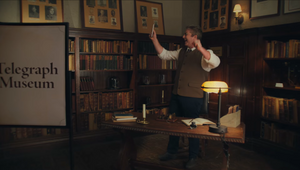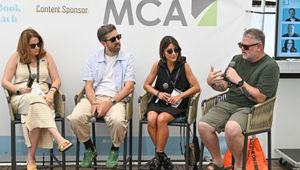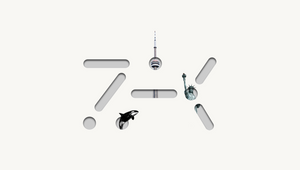
How Zulu Alpha Kilo Made Art to Demonstrate the Pain of Microaggressions

In December 2021, Canadian creative agency, Zulu Alpha Kilo (ZAK), announced the world’s first encyclopaedia for microaggressions, ‘The Micropedia of Microaggressions’. Since then, it has been used in over 123 countries, and has been incorporated into many diversity, equity and inclusion (DEI) programs across public, private and non-profit sectors. However, the team at ZAK was not prepared to finish there. In October, they continued their quest to raise awareness about the harmful nature of microaggressions with the launch of a travelling art exhibit, ‘Worn Down by Words’.
Due to microaggressions often being referred to as ‘death by a thousand paper cuts’ (for their repetitive but painful nature), ‘Worn Down by Words’ drew inspiration from this descriptor to release four pieces - each featuring a microaggression quote outside of a laser-cut silhouette - visualising the impact microaggressions can have on a person’s mental health. With each silhouette constructed via several layers of cut paper (demonstrating how words can wear someone down over time), the art also seeks to represent the internalised harm of microaggressions through the final red layer, and features QR codes which send viewers to ‘The Micropedia’ for further learning and prevention purposes.
As of November, the exhibit has been displayed at several different locations, and will be touring various galleries, schools, workplaces and public spaces, with the intention of educating the public about these harmful practices.
To learn more, LBB’s Josh Neufeldt sat down with the ZAK team to find out how this initiative came to life, and how it served as the perfect follow-up to ‘The Micropedia of Microaggressions’.
LBB> ‘Worn Down by Words’ serves as a follow-up to ‘The Micropedia of Microaggressions’. Please tell us about how this idea came to pass!
Zulu Alpha Kilo> The goal of ‘The Micropedia’ was to be an unbiased, judgement-free place where anyone could learn about microaggressions, their impact, and how to prevent them. While it’s intended to be a factual resource, we felt it was important to also connect with the public on a more human level. That’s where ‘Worn Down by Words’ came from – to show people the impact of their words.
LBB> Last year’s campaign looked at the danger of microaggressions. As a follow-up, was new research done to support this initiative? How did they influence the way the art exhibit was developed?
Zulu Alpha Kilo> Microaggressions are influenced by our systems, language, and culture, so that means they’re constantly evolving. Our partners work in this space daily, so it has allowed us to keep ‘The Micropedia’ a fluid and evolving resource. Within the last year of launching, we’ve updated entries and definitions in order to better reflect experiences. We know ‘microaggression’ is a new term for a lot of people, and our goal has always been to make the issue easier to understand.
For the exhibit, it was important that we chose microaggressions the general public may have come in contact with, said or heard before, so there would be a more personal connection. We also know these moments affect people across many different communities, so we wanted a range of experiences represented as well.
LBB> The art features laser-cut silhouettes. Tell us about how these were made! What was the process like?
Zulu Alpha Kilo> After hearing about the project, CJ Graphics came on board (here in Toronto) to create the pieces. We chose an uncoated eggshell paper stock to stay true to the ideas of papercuts, and to use an everyday material that people encounter. The silhouettes were laser-cut to create individual layers with depth and dimension. Clear spacers further separated each cut layer and added to the depth. We treated the typography with a spot varnish to draw the eye to the microaggression and internalised harm within the final layer.
LBB> Equally important is the writing attached to each piece. What was the process of writing the copy like, and how did you settle on the four you used?
Zulu Alpha Kilo> We wanted to be impactful and resonate with the public, but also clear, so we were really particular when selecting the lines. We looked at articles and research papers to get a better understanding of the lived experiences of individuals from many communities. The four final lines we chose (‘Where are you really from?’, ‘That’s so gay’, ‘She’s such a bitch’, and ‘Shouldn’t all lives matter?’) represent some of the most common verbal microaggressions.

LBB> Another key aspect of the exhibit was the film, which features quotes and interviews from several people who’ve experienced the exhibit. What was the process like, and how did you choose interviewees for the video?
Zulu Alpha Kilo> We worked with our creative content and digital innovation studio (Zulubot) to capture the reaction at each exhibit location. We approached people in the moment to hear their thoughts and feelings. We were lucky to capture a range of passersby’s sentiments, including students and faculty at our school locations, who were willing to speak about their own experiences and the impact of ‘The Micropedia’ and exhibit.
LBB> The exhibit is designed to travel. Tell us more about this! Where have you displayed, and have reactions varied at each stop? How long will the exhibit be travelling for?
Zulu Alpha Kilo> The exhibit launched in Toronto, and has been to the Remote Gallery, Toronto Film School and Humber College. The exhibit and ‘The Micropedia’ have been well-received at each stop. We’re in talks with other organisations and workplaces to become the next stop and incorporate ‘The Micropedia’ into their own DEI efforts. We want to raise awareness in preventing microaggressions, and want to get this initiative in front of as many people as possible. We welcome any organisation who thinks ‘The Micropedia’ and ‘Worn Down by Words’ could make a difference for them.
LBB> As a whole, how have people reacted to this initiative?
Zulu Alpha Kilo> The reaction to ‘The Micropedia’ and ‘Worn Down by Words’ has been amazing. Seeing the resources being used by people and incorporated into institutions and workplaces is really validating, and we’ve heard from folks that they believe it will help create change in their daily lives. The Government of Canada has incorporated ‘The Micropedia’ into their ‘50-30 Challenge’, which is a program that seeks to accelerate diversity efforts in workplaces nationwide. Everyone who worked so hard on ‘The Micropedia’, from our coalition of DEI partners to agency folk, were thrilled to see it in use, and to know that it can help create safer spaces for everyone.
LBB> Is there a particular piece of art which hits home for you?
Zulu Alpha Kilo> The thing about microaggressions is that no single experience is the same. While they affect a wide range of communities and groups, there is also so much intersectionality between categories of microaggressions. Each of us could connect to different pieces for different reasons.
LBB> What challenges have you faced during the making of or displaying of this exhibit? How did you overcome them?
Zulu Alpha Kilo> Securing locations in the midst of an ongoing pandemic has been a challenge. We want to reach workplaces and larger organisations to maximise our impact, however, many of the organisations we’re speaking with are still establishing what in-person looks like for them, which has slowed the process.
LBB> What advice would you give to people facing microaggressions on a frequent basis at work?
Zulu Alpha Kilo> In our industry, we are by no means experts in microaggressions. Thankfully, we’ve had our partners’ expertise to lead us and help us better understand the issue. There are a lot of emotions and physical and mental hardships that come along with microaggressions. So, first and foremost, you should prioritise your feelings and wellbeing when navigating these situations. You’re not obligated to address microaggressions in the moment (or at all), but if you feel safe to, you can speak to the person about why the experience you had with them was offensive. ‘The Micropedia’ does have a tips page with resources on how to navigate microaggressions. Our hope is that ‘The Micropedia’ can be a tool in these moments, as well to help facilitate tough conversations and help ease everyone through difficult moments.
LBB> Is there anything you’d like to add?
Zulu Alpha Kilo> We’re thankful for the chance to share this initiative with more people. Our goal has always been to get ‘The Micropedia’ into the hands of individuals and organisations around the world so that it can continue to grow and create positive behaviour change.















